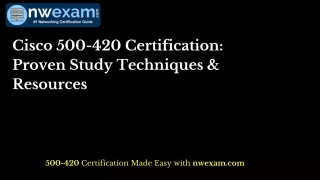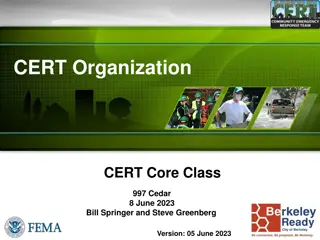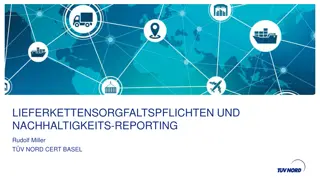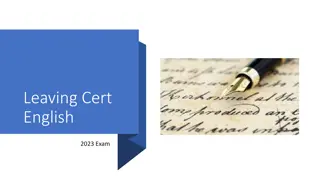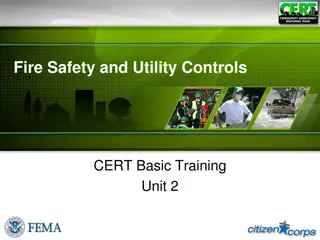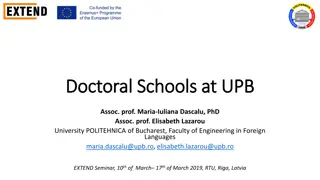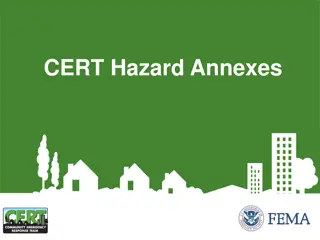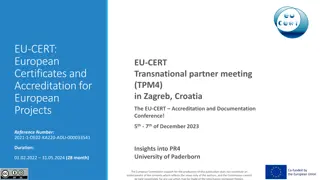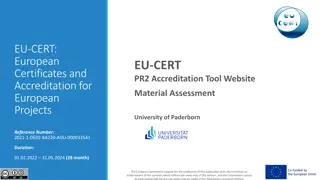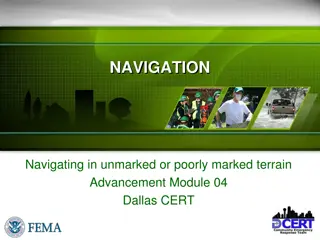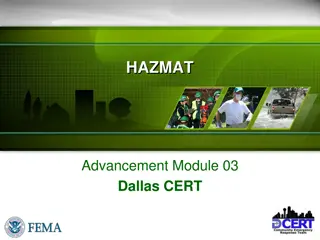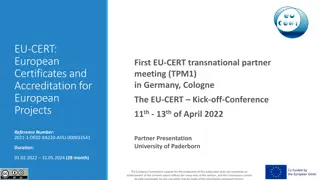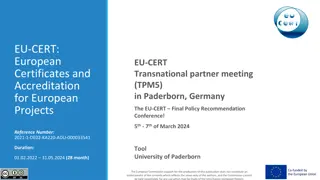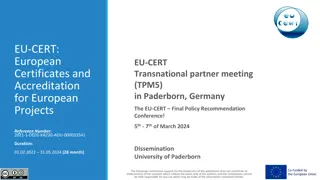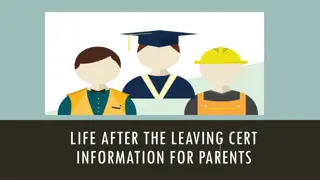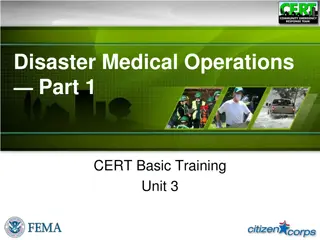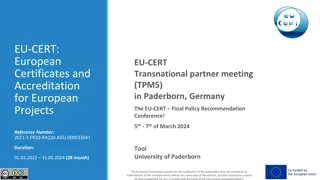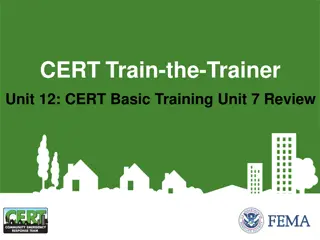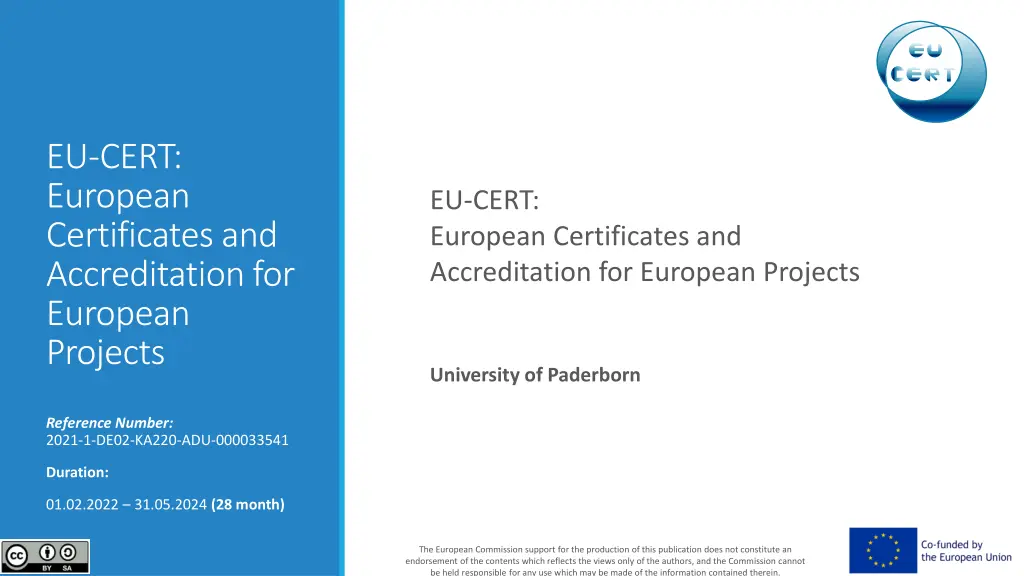
Enhancing Quality in Adult Education with EU-CERT Project
The EU-CERT project focuses on promoting adult education results from ERASMUS+ projects and addressing the need for accredited certificates in the field. Through a comprehensive accreditation system, the project aims to improve transparency and quality in European adult education outcomes. Partnered with various organizations across Europe, EU-CERT strives to facilitate the transfer of project results into practical adult education settings. Supported by the European Commission, this initiative emphasizes the importance of evidence-based approaches and certified outcomes in adult education.
Download Presentation

Please find below an Image/Link to download the presentation.
The content on the website is provided AS IS for your information and personal use only. It may not be sold, licensed, or shared on other websites without obtaining consent from the author. If you encounter any issues during the download, it is possible that the publisher has removed the file from their server.
You are allowed to download the files provided on this website for personal or commercial use, subject to the condition that they are used lawfully. All files are the property of their respective owners.
The content on the website is provided AS IS for your information and personal use only. It may not be sold, licensed, or shared on other websites without obtaining consent from the author.
E N D
Presentation Transcript
EU-CERT: European Certificates and Accreditation for European Projects EU-CERT: European Certificates and Accreditation for European Projects University of Paderborn Reference Number: 2021-1-DE02-KA220-ADU-000033541 Duration: 01.02.2022 31.05.2024 (28 month) The European Commission support for the production of this publication does not constitute an endorsement of the contents which reflects the views only of the authors, and the Commission cannot be held responsible for any use which may be made of the information contained therein.
Partners of EU Partners of EU- -CERT CERT Associa o Rede de Universidades da Terceira Idade PortugalCentro University of Paderborn Germany (Coordinator) Esquare France Provence-Alpes-C te d'Azur TIR Consulting Group j.d.o.o Croatia Grad Zagreb Ingenious Knowledge GmbH Germany (Technical partner) STANDO LTD Cyprus (K pros) Nicosia "Dieses Foto" von Unbekannter Autor ist lizenziert gem CC BY-SA "Dieses Foto" von Unbekannter Autor ist lizenziert gem CC BY-NC "Dieses Foto" von Unbekannter Autor ist lizenziert gem CC BY-SA The European Commission support for the production of this publication does not constitute an endorsement of the contents which reflects the views only of the authors, and the Commission cannot be held responsible for any use which may be made of the information contained therein.
About EU About EU- -CERT CERT The EU-CERT project focuses on adult education. Initial position: One of the core ideas is to promote adult education results created within ERASMUS+ projects. Typically, there is no certification or accreditation of those. Preliminary Studie of EU-CERT- A needs analysis (Winter 2020, N=250) 87% of the consulted users complain about intransparency and weak quality of European adult education project results which cannot be transferred into daily adult education practice. 86.5% stated that there is a strong need to get to evidence-based approaches to certification and that certificates are badly needed in adult education. The participant emphasized that the need is specifically for accredited certificates. 84% answered, that adult education projects of the EU were seen critical with regard to the quality of their outcomes The participants underpinned that many EU projects create results for adult education but (a) not many people are aware of them (79%), (b) the quality of the results is not certified (87%), and (c) and the possibilities for an good transfer into other adult education organisation is not made clear ( 89.5%). The European Commission support for the production of this publication does not constitute an endorsement of the contents which reflects the views only of the authors, and the Commission cannot be held responsible for any use which may be made of the information contained therein.
About EU About EU- -CERT CERT Here the EU-CERT project comes into action: The project tries to enhance quality in adult education and helps to ensure that adult education providers are able to find high quality adult education results which can be used in practice and which base on excellent adult education projects. Therefore, the project consortium is going to develop a mechanism to monitor the effectiveness of adult education project via an accreditation system which is based on clear criteria and a solid accreditation procedure. Core project result is the accreditation system of EU-CERT The European Commission support for the production of this publication does not constitute an endorsement of the contents which reflects the views only of the authors, and the Commission cannot be held responsible for any use which may be made of the information contained therein.
About EU About EU- -CERT CERT Benefits of EU-CERT: This will help to support common shared values in adult education and is the basis for civic engagement which is fostered by excellent adult education approaches. Moreover, it fosters the participation of European adult educator in a high quality adult education network with ensured standards. An accreditation system for projects which run under adult education promotes the idea of ERAMUS+ and offers another way of transparency and visibility in Europe. All seniors and all European citizens get a possibilty to find excellent adult education resources via the accreditation information and standards. This is the crucial basis for enhancing quality assureance in adult education. The European Commission support for the production of this publication does not constitute an endorsement of the contents which reflects the views only of the authors, and the Commission cannot be held responsible for any use which may be made of the information contained therein.
Project Project Result Result1 1 EU-CERT - RESEARCH ON QUALITY CRITERIA, ACCREDITATION AND CERTIFICATE STRUCTURES (LEADING ORGA: UNIVERSITY OF PADERBORN) The European Commission support for the production of this publication does not constitute an endorsement of the contents which reflects the views only of the authors, and the Commission cannot be held responsible for any use which may be made of the information contained therein.
Project Project Result Result1 1 Mixed Mixed- -Methods Design of Methods Design of the theResearch Research Needs analysis (Nov./ Dec. 2021): more than 80% of the participants asked for evidences concerning the situation with regard to certification and accreditation in adult education To take this need for serious we designed this first project result which ones with evidence derived from research in the partner countries. The European Commission support for the production of this publication does not constitute an endorsement of the contents which reflects the views only of the authors, and the Commission cannot be held responsible for any use which may be made of the information contained therein.
Project Project Result Result1 1 Mixed Mixed- -Methods Design of Methods Design of the theResearch Research This project result 1 (PR1) provides deep research on existing certificate and quality assureance structures in the partner countries of EU-CERT. It basis on the already existing needs analysis which was done before applying for this projects. The needs analysis gave a general overview on the accreditation and certification structure in adult education with regard to ERASMUS+. It should that there exist several general quality assureance solutions in the partner countries but that there is no focus no general accreditation process which takes the ERASMUS+ results into account and fosters transparency of the ERASMUS+ adult education programme. Also it was clear after the needs analysis that there is a variety of quality assureance approaches. Our needs analysis before this application was a formal, systematic process of identifying and evaluating the need for such an certification and accreditation process in the field of adult education. It also showed that just a PDCA-cycle (Plan, Do, Check, Act) cannot be an adeqaute basis for future quality assureance and accreditation in adult education. This means, to design a feasible approach within EU-CERT, we need more detailed information about the existing processes. To make sure that there are no double works and that existing strutures will be taken under account the IO1 research of EU-CERT gathers the existing quality criteria and puts them together in a criteria matrix. Therefore, the certificate structures and quality criteria will be explained by experts in interviews to get a deeper insight and also existing accreditation processes are explained and documented. The European Commission support for the production of this publication does not constitute an endorsement of the contents which reflects the views only of the authors, and the Commission cannot be held responsible for any use which may be made of the information contained therein.
Project Project Result Result1 1 Mixed Mixed- -Methods Design of Methods Design of the theResearch Research Project result 1 (PR1) - EU- CERT - Research on Quality criteria, Accreditation and Certificate Structures" comes with Quantitative Research: Qualitative Research: (III) broad questionnaire on quality assurance with regard to ERASMUS+ and necessary quality criteria as well as exisiting certification elements (I) desktop research in each partner country and (II) combines this with 5 expert interviews in each country This is a crucial basis for the concept design in PR2 and the programming in PR3 The European Commission support for the production of this publication does not constitute an endorsement of the contents which reflects the views only of the authors, and the Commission cannot be held responsible for any use which may be made of the information contained therein.
Project Project Result Result1 1 Mixed Mixed- -Methods Design of Methods Design of the theResearch Research It makes sure that technical issues and critera related issues are addressed in adequate ways. Moreover this means that it it necessary to focus on how the organisations in the partner countries keep the documentation of an educational programme, how they evaluate the quality of an educational programme and adherence to the curriculum and its quality. In addtion to that it is useful to get deeper knowledge about existing equipment and personnel resources of educational programme compared with the educational measure that is the subject of accreditation. The European Commission support for the production of this publication does not constitute an endorsement of the contents which reflects the views only of the authors, and the Commission cannot be held responsible for any use which may be made of the information contained therein.
Project Project Results Results1 1 - -Qualitative Research Qualitative Research (I) desktop research in each partner country Deep research on existing certificate and quality assurance structures in the partner countries of EU-CERT. 1. What are the common existing certificates in your country? 2. How is the quality assurance structure of the certificates in your countries? The European Commission support for the production of this publication does not constitute an endorsement of the contents which reflects the views only of the authors, and the Commission cannot be held responsible for any use which may be made of the information contained therein.
Project Project Results Results1 1 - -Qualitative Research Qualitative Research (II) 5 expert interviews in each country Summary of potential semi- standard key questions: 1. How satisfied are you with the common existing certificates in your country? 2. What are necessary quality criteria for certificantes? 3. What is necessary to guarantee great transparency of certificates? 4. How satisfied are you with the quality assurance structure of the certificates in your countries? 1. Let s discuss some further, potential questions! 2. Voting for 3 or 4 questions for the expert interview 5. What are necessary quality criteria for quality assurance structures? 6. What are benefits of certificates in educational environment? The European Commission support for the production of this publication does not constitute an endorsement of the contents which reflects the views only of the authors, and the Commission cannot be held responsible for any use which may be made of the information contained therein.
Project Project Results Results1 1 Quantitative Research Quantitative Research Quantitative Research: (III) broad questionnaire on quality assurance with regard to ERASMUS+ and necessary quality criteria as well as exisiting certification elements Based on the results of the qualitative research (I) and (II), we will create a standardise quantitaive questionnaire, which will be spread to experts as well as stakeholders Herefore, we will use an online survey tool and spread the questionnaire link to all partner institutions The survey will be available in all partner languages! The European Commission support for the production of this publication does not constitute an endorsement of the contents which reflects the views only of the authors, and the Commission cannot be held responsible for any use which may be made of the information contained therein.
Universitt Paderborn Department Wirtschaftsp dagogik Lehrstuhl Wirtschaftsp dagogik II Warburger Str. 100 33098 Paderborn Prof. Dr. Marc Beutner Tel: Fax: E-Mail: +49 (0) 52 51 / 60 - 23 67 +49 (0) 52 51 / 60 - 35 63 marc.beutner@uni-paderborn.de http://www.upb.de/wipaed The European Commission support for the production of this publication does not constitute an endorsement of the contents which reflects the views only of the authors, and the Commission cannot be held responsible for any use which may be made of the information contained therein.

